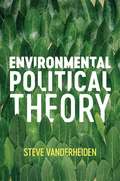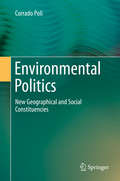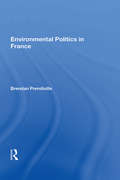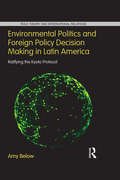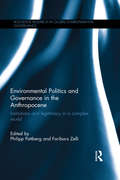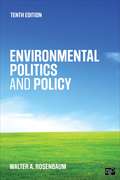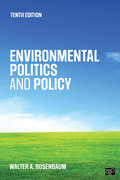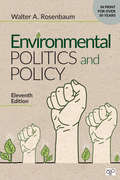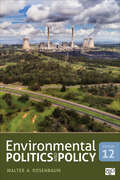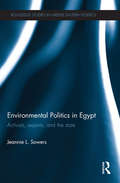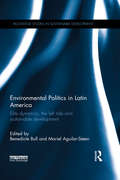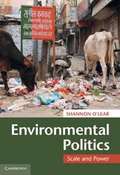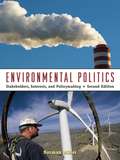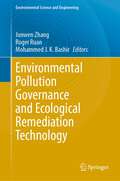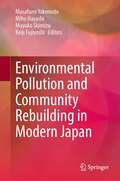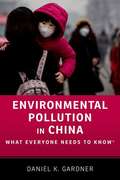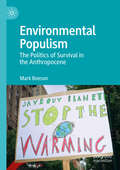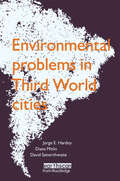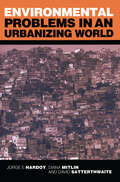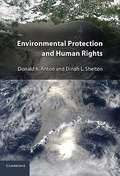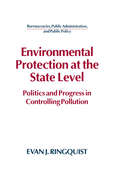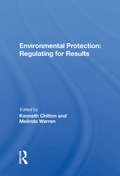- Table View
- List View
Environmental Political Theory
by Steve VanderheidenOur politics is intimately linked to the environmental conditions - and crises - of our time. The challenges of sustainability and the discovery of ecological limits to growth are transforming how we understand the core concepts at the heart of political theory. In this essential new textbook, leading political theorist Steve Vanderheiden examines how the concept of sustainability challenges – and is challenged – by eight key social and political ideas, ranging from freedom and equality to democracy and sovereignty. He shows that environmental change will disrupt some of our most cherished ideals, requiring new indicators of progress, new forms of community, and new conceptions of agency and responsibility. He draws on canonical texts, contemporary approaches to environmental political theory, and vivid examples to illustrate how changes in our conceptualization of our social aspirations can inhibit or enable a transition to a just and sustainable society. Vanderheiden masterfully balances crystal clear explanation of the essentials with cutting-edge analysis to produce a book that will be core reading for students of environmental and green political theory everywhere.
Environmental Politics
by Corrado PoliA change in the way humans relate to nature could be the starting point for a new politics, which will also affect relations among humans. A new approach would help to radically transform the production system, not because it is unjust in the usually considered social terms, but because it endangers nature and humanity. So far, the citizens' grassroots organizations have failed to win broad consensus and political power in the representative institutions. When the time comes to transform the single environmental issue into an electoral platform, environmentalists lose unity and effectiveness since they lack a common political vision and an ensuing strategy. On the other hand European politics is rapidly transforming because the challenge brought by so-called populist movements. We need to transform activists' shared emotions and attitudes into political ideologies and platforms. Moreover, a new educational process and a new science politics are necessary to reform environmental policy.
Environmental Politics In France
by Brendan PrendivilleThis book analyzes the history and growth of the French environmental movement from its origins in the "back to the earth" wave of the early 1970s to its current influence on every political party from the Trotskyist left to the extreme right of the National Front. .
Environmental Politics and Foreign Policy Decision Making in Latin America: Ratifying the Kyoto Protocol (Role Theory and International Relations)
by Amy BelowAlthough the Kyoto Protocol, an international agreement to address global climate change, has been regarded by many as an unsuccessful treaty both politically and environmentally, it stands as one of the world’s few truly global agreements. Why did such a diverse group of countries decide to sign and/or ratify the treaty? Why did they choose to do so at different times and in different ways? What explains their foreign policy behavior? Amy Below’s book builds off the increasing significance of climate change and uses the Kyoto Protocol as a case study to analyze foreign policy decision making in Latin America. Below’s study takes a regional perspective in order to examine why countries in Latin America made disparate foreign policy choices when they were faced with the same decision. The book looks at the decisions in Argentina, Mexico, and Venezuela via a process-tracing method. Below uses information obtained from primary and secondary documents and elite interviews to help reconstruct the processes, and augments her reconstruction with a content analysis of Conference of the Parties speeches by presidents and country delegates. The book complies with convention in the field by arguing that systemic, national and individual-level factors simultaneously impact foreign policy decisions, but makes the additional claim that role theory most accurately accounts for relationships between variables. Environmental Politics and Foreign Policy Decision Making in Latin America considers a variety of factors on individual, national, and international levels of analysis, and show that the foreign policy decisions are best viewed through the prism of role theory. The book also draws conclusions about the value of role theory in general and about environmental foreign policy decisions in developing countries, which will be of value to both policy-makers and academics.
Environmental Politics and Governance in the Anthropocene: Institutions and legitimacy in a complex world (Routledge Research in Global Environmental Governance)
by Fariborz Zelli Philipp PattbergThe term Anthropocene denotes a new geological epoch characterized by the unprecedented impact of human activities on the Earth’s ecosystems. While the natural sciences have advanced their understanding of the drivers and processes of global change considerably over the last two decades, the social sciences lag behind in addressing the fundamental challenge of governance and politics in the Anthropocene. This book attempts to close this crucial research gap, in particular with regards to the following three overarching research themes: (i) the meaning, sense-making and contestations emerging around the concept of the Anthropocene related to the social sciences; (ii) the role and relevance of institutions, both formal and informal as well as international and transnational, for governing in the Anthropocene; and (iii) the role and relevance of accountability and other democratic principles for governing in the Anthropocene. Drawing together a range of key thinkers in the field, this volume provides one of the first authoritative assessments of global environmental politics and governance in the Anthropocene, reflecting on how the planetary scale crisis changes the ways in which humans respond to the challenge. This volume will be of great interest to students and scholars of global environmental politics and governance, and sustainable development.
Environmental Politics and Policy
by Walter A. RosenbaumThis book covers the context of the environmental policy process, as well as exploring specific environmental issues. It examines topics such as toxic and hazardous substances; energy - both fossil fuel and nuclear' public lands; and global policy-making ocusing on climate change and transboundary politics.
Environmental Politics and Policy
by Walter A. RosenbaumWalter A. Rosenbaum’s classic Environmental Politics and Policy, Tenth Edition once again provides definitive coverage of environmental politics and policy, lively case material, and a balanced assessment of current environmental issues. The first half of the book sets needed context and describes the policy process while the second half covers specific environmental issues such as air and water; toxic and hazardous substances; energy; and a global policymaking chapter focused on climate change and transboundary politics. Covering major environmental policy initiatives and controversies during President Obama's two terms and capturing the sudden and radical changes occurring in the American energy economy, this Tenth Edition offers the needed currency and relevancy for any environmental politics course.
Environmental Politics and Policy
by Walter A. RosenbaumWalter A. Rosenbaum’s classic Environmental Politics and Policy, Tenth Edition once again provides definitive coverage of environmental politics and policy, lively case material, and a balanced assessment of current environmental issues. The first half of the book sets needed context and describes the policy process while the second half covers specific environmental issues such as air and water; toxic and hazardous substances; energy; and a global policymaking chapter focused on climate change and transboundary politics. Covering major environmental policy initiatives and controversies during President Obama's two terms and capturing the sudden and radical changes occurring in the American energy economy, this Tenth Edition offers the needed currency and relevancy for any environmental politics course.
Environmental Politics and Policy
by Walter A. RosenbaumWalter A. Rosenbaum’s classic Environmental Politics and Policy provides definitive coverage of environmental politics and policy, lively case material, and a balanced assessment of current environmental issues. The first half of the book sets needed context and describes the policy process while the second half covers specific environmental issues such as air and water; toxic and hazardous substances; energy; and a global policymaking chapter focused on climate change and trans-boundary politics. The eleventh edition includes updates on the Trump administration's initiatives and controversies with regard to environmental policy, offering the currency and relevancy needed for any environmental politics course.
Environmental Politics and Policy
by Walter A. RosenbaumWalter A. Rosenbaum’s classic Environmental Politics and Policy provides definitive coverage of environmental politics and policy, lively case material, and a balanced assessment of current environmental issues. The first half of the book sets needed context and describes the policy process while the second half covers specific environmental issues such as air and water; toxic and hazardous substances; energy; and a global policymaking chapter focused on climate change and trans-boundary politics. The eleventh edition includes updates on the Trump administration's initiatives and controversies with regard to environmental policy, offering the currency and relevancy needed for any environmental politics course.
Environmental Politics and Policy
by Walter A. RosenbaumWalter A. Rosenbaum′s classic Environmental Politics and Policy, Twelfth Edition, provides definitive coverage of environmental politics and policy, lively case material, and a balanced assessment of current environmental issues. The newly streamlined first half of the book sets needed context and describes the policy process, while the second half covers specific environmental issues such as air and water, toxic and hazardous substances, energy, and global policymaking on issues like climate change and trans-boundary politics. The Twelfth Edition includes updated case studies and a look at the transition in environmental policies between the Trump and Biden administrations, offering students a current and relevant look at the continuing challenge of reconciling sound science with practical politics.
Environmental Politics and Policy
by Walter A. RosenbaumWalter A. Rosenbaum′s classic Environmental Politics and Policy, Twelfth Edition, provides definitive coverage of environmental politics and policy, lively case material, and a balanced assessment of current environmental issues. The newly streamlined first half of the book sets needed context and describes the policy process, while the second half covers specific environmental issues such as air and water, toxic and hazardous substances, energy, and global policymaking on issues like climate change and trans-boundary politics. The Twelfth Edition includes updated case studies and a look at the transition in environmental policies between the Trump and Biden administrations, offering students a current and relevant look at the continuing challenge of reconciling sound science with practical politics.
Environmental Politics in Egypt: Activists, Experts and the State (Routledge Studies in Middle Eastern Politics)
by Jeannie SowersDrawing on extensive fieldwork conducted in Egypt from the late 1990s to 2011, this book shows how experts and activists used distinctive approaches to influence state and firm decision-making in three important environmental policy domains. These include; industrial pollution from large-scale industry, the conservation of threatened habitat, and water management of the irrigation system. These cases show how environmental networks sought to construct legal, discursive, and infrastructural forms of authority within the context of a fragmented state apparatus and a highly centralized political regime. ‘Managerial networks’, composed of environmental scientists, technocrats, and consultants, sought to create new legal regimes for environmental protection and to frame environmental concerns so that they would appeal to central decision-makers. Activist networks, in contrast, emerged where environmental pollution or exclusion from natural resources threatened local livelihoods and public health. These networks publicized their concerns and mobilized broader participation through the creative use of public space, media coverage, and strategic use of existing state-sanctioned organizations. With the increased popular mobilization of the 2000s, and the mass protests of the 2011 revolution, environmental politics has become highly topical. Expert and activist networks alike have sought to broaden their appeal and diversify their approaches. The result may well be a more contested, participatory, and dynamic phase in Egyptian environmentalism.
Environmental Politics in Latin America: Elite dynamics, the left tide and sustainable development (Routledge Studies in Sustainable Development)
by Benedicte Bull Mariel Cristina Aguilar-StoenSince colonial times the position of the social, political and economic elites in Latin America has been intimately connected to their control over natural resources. Consequently, struggles to protect the environment from over-exploitation and contamination have been related to marginalized groups’ struggles against local, national and transnational elites. The recent rise of progressive, left-leaning governments – often supported by groups struggling for environmental justice – has challenged the established elites and raised expectations about new regimes for natural resource management. Based on case-studies in eight Latin American countries (Argentina, Brazil, Chile, Ecuador, Colombia, Bolivia, El Salvador and Guatemala), this book investigates the extent to which there have been elite shifts, how new governments have related to old elites, and how that has impacted on environmental governance and the management of natural resources. It examines the rise of new cadres of technocrats and the old economic and political elites’ struggle to remain influential. The book also discusses the challenges faced in trying to overcome structural inequalities to ensure a more sustainable and equitable governance of natural resources. This timely book will be of great interest to researchers and masters students in development studies, environmental management and governance, geography, political science and Latin American area studies.
Environmental Politics: Scale and Power
by Shannon O'LearShannon O'Lear brings a geographer's perspective to environmental politics. The book considers issues of climate change, energy, food security, toxins, waste, and resource conflict to explore how political, economic, ideological and military power have contributed to the generation of environmental issues and the formation of dominant narratives about them. The book encourages the reader to think critically about the power dynamics that shape (and limit) how we think about environmental issues and to expand the reader's understanding of why it matters that these issues are discussed at particular spatial scales. Applying a geographer's sense of scale and power leads to a better understanding of the complexity of environmental issues and will help formulate mitigation and adaptation strategies. The book will appeal mainly to advanced students and researchers from a geography background, but also to social and political scientists who wish to look at the topic from this different perspective.
Environmental Politics: Stakeholders, Interests, and Policymaking
by Norman MillerThe second edition of Environmental Politics: Stakeholders, Interests, and Policymaking shows students that environmental politics is fundamentally a clash of competing stakeholders’ interests, and environmental policy the result of their reconciliation. But developments in environmental policymaking over the past several years have been little short of earthshaking. The text not only marks changes in the formal lawmaking process itself, but covers recent elements reshaping environmental politics, such as: the new environmentally activist posture of business the dramatic shift of policymaking influence from the federal to state and local levels the participation of new actors on the environmental policy stage, most notably the faith community the U-turn of organized labor, from opponent of environmentalists to their collaborator the consolidation of the varying missions of environmental advocacy groups to fight global warming the emergence of science from its historic political neutrality to open advocacy the increasing role of both the media and the judiciary Written by an expert with more than 25 years of "smoke-filled room" experience in environmental policymaking, Environmental Politics: Stakeholders, Interests, and Policymaking gives students an insider's view of how policies are forged. By examining current environmental issues through a stakeholder lens, this book not only provides a unique perspective into how policies are adopted, but also illuminates the transformative power of global warming as a political force.
Environmental Pollution Governance and Ecological Remediation Technology (Environmental Science and Engineering)
by Junwen Zhang Roger Ruan Mohammed J. K. BashirThis book provides the advance research results of environmental pollution and governance and covers the main research field of environmental remediation, environmental monitoring, sanitation and so on. Nowadays, environmental pollution, as one of the most important problems in the world, has seriously affected the global ecology, temperature, water resources and so on. Therefore, the research on environmental governance can better help us comprehend the methods and measures of environmental protection and protect our ecology more scientifically and effectively. This book also aims to promote scientific information interchange between scholars from the top universities, research centers and high-tech enterprises working all around the world. It is beneficial to scholars, engineers and researchers in the field of environmental engineering and environmental governance.
Environmental Pollution and Community Rebuilding in Modern Japan
by Keiji Fujiyoshi Masafumi Yokemoto Miho Hayashi Mayuko ShimizuThis book describes how modern industry affected people in Japan and their communities by polluting their living environment with toxic emissions. It also shows how the populace endeavored not only to restore their once-clean environment but also to rebuild communities that had been damaged by pollution and its accompanying effects. Environmental pollution is usually referred to in Japan as kogai, public damage, meaning that such pollution not only harms the physical environment—air, water, soil, and the human body—but also destroys the social and personal relationships in the polluted area. Those people who took action recognized that industrial and economic development had been given the highest national priority even at the cost of their health and welfare. In this sense, anti-kogai movements led them to alternative community development and to rethinking what kind of environment and community they wanted. This book also explores the efforts driven by residents in several parts of Japan after the middle of the twentieth century and the endeavors of museums and archives as a memorial to those who suffered from the pollution and for the prospect of a better society with a good environment.
Environmental Pollution in China: What Everyone Needs to Know (What Everyone Needs To Know)
by Daniel K. GardnerChina suffers from a range of environmental pollution problems: air, water, soil, electronic waste, noise, and light. But air, water, and soil pollution and the scourge of electronic waste have been the most environmentally costly and have had the most dramatic effects on public health. In Environmental Pollution in China: What Everyone Needs to Know, Daniel K. Gardner examines the range of factors -- economic, social, political, and historical -- contributing to the degradation of China's environment. He also covers the public response to the widespread pollution; the measures the government is taking to clean up the environment; and the country's efforts to lessen its dependence on fossil fuels and develop clean sources of energy. Concise, accessible, and authoritative, this book serves as an ideal primer on one of the world's most challenging environmental crises.
Environmental Populism: The Politics of Survival in the Anthropocene
by Mark BeesonThis book evaluates climate change and populism, two ideas that do not generally go together. The author argues that perhaps they should if policymakers are to be galvanized into action before it is too late. Although populism is usually associated with right-wing authoritarianism, there is growing interest in more progressive forms of populist politics. Across the world, young people in particular are mobilizing to demand change from an older generation that appears to be incapable of action or is hostage to powerful vested interests and outdated ideas. In this book, the author explains why populist forms of political action may yet provide the key to effective policies, which are often discussed but less frequently implemented. Accessible and trenchantly argued, this book presents a primer for the politics of survival.
Environmental Problems in Third World Cities
by David Satterthwaite Diana Mitlin Jorge E. HardoyDescribes and analyses the environmental problems of Third World cities, showing how they affect human health and the local ecology. The authors show how readily available practical solutions are, if the political means can be found.
Environmental Problems in an Urbanizing World: Finding Solutions in Cities in Africa, Asia and Latin America
by David Satterthwaite Diana Mitlin Jorge E. HardoyNew edition of Environmental Problems in Third World Cities Cities in Africa, Asia and Latin America contain some of the world's most life- and health-threatening human environments. Environment-related diseases and injuries cause millions of preventable deaths each year. In many squatter settlements, children are 40 to 50 times more likely to die before the age of five than they would be in Europe or North America and most such deaths are environment-related. Many cities also cause serious environmental degradation to their surroundings and increasingly contribute to global warming. This updated and much expanded edition of the classic Environmental Problems in Third World Cities describes environmental problems and their effect on human health, local ecosystems and global cycles. It points to the political causes that underpin many of these problems - including ineffective, unaccountable governments, and aid agencies' reluctance to work with the urban poor. It also highlights innovative solutions such as: * High-quality, low-cost homes and neighbourhoods developed by urban poor groups working with local non-governmental organizations * Local Agenda 21s developed by municipal governments in partnership with community organizations.* In their analysis, the authors show that cities can meet sustainable development goals. There are practical, affordable solutions to their environmental problems, but most of these depend on more competent and accountable city governments and on more support for low-income households and their organizations. The book also outlines the changes needed international aid agencies to support this. PRAISE FOR THE FIRST EDITION 'It's rare to encounter a work as authoritative and accessible as this. It is a mine of useful information from cities in every corner of the Third World, which does not shy away from the immensity of the problems, but says as much about the solutions to them as about the problems themselves' Jonathon Porritt 'Well written and very accessible' The Geographical Journal 'Of value to students, teachers, practitioners, policy makers and aid agencies' Third World Planning Review 'A valuable resource for understanding the underlying problems�[this book offers] practical alternatives' Cities International.
Environmental Protection and Human Rights
by Donald K. Anton Dinah SheltonWith unique scholarly analysis and practical discussion, this book provides a comprehensive introduction to the relationship between environmental protection and human rights being formalized into law in many legal systems. This book instructs on environmental techniques and procedures that assist in the protection of human rights. The text provides cogent guidance on a growing international jurisprudence on the promotion and protection of human rights in relation to the environment that has been developed by international and regional human rights bodies and tribunals. It explores a rich body of case law that continues to develop within states on the environmental dimension of the rights to life, to health, and to public participation and access to information. Five compelling contemporary case studies are included that implicate human rights and the environment, ranging from large dam projects to the creation of a new human right to a clean environment.
Environmental Protection at the State Level: Politics and Progress in Controlling Pollution (Bureaucracies, Public Administration, And Public Policy Ser.)
by Evan J. RingquistWhy do some states enact stronger pollution control progammes than others? And, do stronger controls have identifiable impacts on environmental quality in these states? This work seeks to answer these question by means of combining data, methods and theory from the natural and social sciences.
Environmental Protection: Regulating For Results
by Kenneth Chilton Melinda WarrenThis book presents a perspective on environmental regulation that is underreported in the national media. It addresses the need for environmental protection at two levels: analyses of ecological concerns and policy responses and general principles that apply to various environmental issues.
